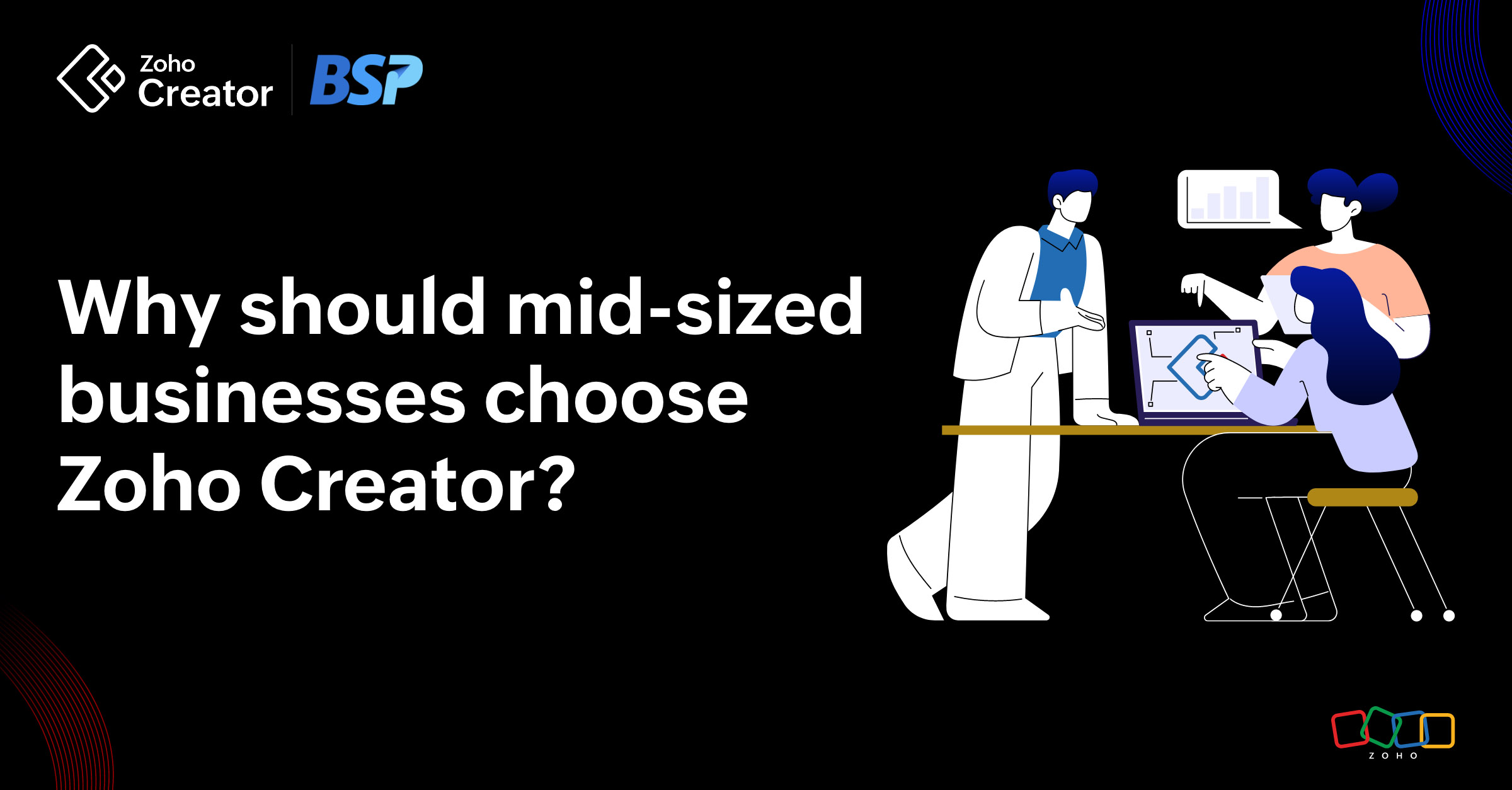- HOME
- Create Your Way
- The role of low-code in digitizing manufacturing
The role of low-code in digitizing manufacturing
- Last Updated : April 20, 2023
- 914 Views
- 5 Min Read
Manufacturing has always been a complex and rapidly changing industry. It's constantly evolving, and manufacturers are under immense pressure to optimize their production processes and meet the increasing demands of customers.
But traditional software development methods are often slow, expensive, and can take months or even years to deliver a working application. This is where low-code development platforms, such as Zoho Creator, come in.
Zoho Creator is a low-code development platform that is rapidly gaining popularity in the manufacturing industry, due to its ability to simplify and accelerate software development. In this article by Paul Trinidad, Director of Operations in the USA, and Angela Trinidad, Operations Coordinator and contributing researcher, both with BSP, one of our premium partners—we'll explore the benefits and challenges of low-code development in manufacturing, along with an example of a customer implementation.
What is low-code development?
Low-code development is a software development approach that allows non-technical users to develop and deploy applications quickly and efficiently, using visual interfaces and prebuilt modules.
With Zoho Creator, users can create applications without writing code, using drag-and-drop interfaces, and prebuilt templates. This approach offers several advantages over traditional software development methods, including accelerated software development, reduced development costs and time-to-market, improved collaboration between IT and business teams, and increased flexibility to adapt to changing business needs.
Exploring the benefits of low-code in manufacturing
Low-code development has become increasingly popular in the manufacturing industry, due to its ability to improve processes, increase efficiency, and reduce costs. Low-code increases productivity and efficiency by streamlining manufacturing processes and reducing manual intervention. Additionally, it helps to minimize development costs and reduce time-to-market by eliminating the need for developers to write extensive code from scratch.
Furthermore, low-code development improves collaboration between IT and business teams. Both teams can work together to develop applications using low-code development platforms. Finally, low-code development offers increased flexibility and agility to adapt to changing business needs.
Applications can also be modified quickly and easily, enabling manufacturers to optimize their processes, reduce costs, and stay competitive in an ever-changing market. With Zoho Creator, manufacturing companies can take advantage of these benefits and quickly build custom applications tailored to their unique business needs.
To better understand the possible use cases of low-code development in manufacturing, here are some insights into its real-life applications.
Inventory management - Inventory management is a critical aspect of the manufacturing process. Low-code development can be used to create applications that help manufacturers track and optimize inventory levels in real time, and prevent stockouts.
For example, an application can be created to alert the inventory manager when a certain item is running low or when it's time to reorder. By monitoring inventory levels, manufacturers can reduce waste and improve their overall efficiency.
Quality control - Quality control is another essential aspect of the manufacturing process. Low-code development platforms can be used to create applications that monitor product quality at every stage of the production process. These applications can help manufacturers identify defects early on, reduce scrap and rework, and ensure that the final product meets the required quality standards.
For example, an application can be created to monitor the temperature and humidity levels during the production process to ensure that the product is produced in the correct environment.
Predictive maintenance - Predictive maintenance is the use of data and analytics to predict equipment failure and prevent unplanned downtime. Low-code development can be used to create applications that monitor equipment and detect potential issues before they become major problems.
For example, an application can be created to track the performance of equipment and alert the maintenance team when a piece of equipment is due for service. By reducing downtime, manufacturers can increase their overall efficiency and productivity.
Supply chain management - Supply chain management is critical to the success of any manufacturing operation. Low-code development can be used to create applications that help manufacturers manage their supply chain more effectively. These applications can include tracking shipments, monitoring supplier performance, and optimizing logistics operations.
For example, an application can be created to track the shipment of raw materials from the supplier to the manufacturing facility. By improving supply chain management, manufacturers can reduce costs and improve efficiency.
Manufacturing analytics - Manufacturing analytics involves the collection and analysis of data from various manufacturing processes. Low-code development can be used to create applications that collect and analyze data to identify areas for improvement, optimize processes, and make data-driven decisions.
For example, an application can be created to analyze data from the production line and identify bottlenecks or inefficiencies. By using manufacturing analytics, manufacturers can improve efficiency and reduce costs.
A low-code success story
BSP is a Zoho Premium Partner with years of expertise in crafting custom manufacturing solutions on Zoho Creator. One interesting implementation they've handled was with a manufacturing and installation client, which showcases the transformative power of low-code development in the manufacturing industry. The client was facing some serious challenges, particularly in project management, which was mostly done manually and was not keeping up with the demands of their industry.
To help them out, BSP suggested building a solution on Zoho Creator that would allow them to plan projects, assign tasks, monitor progress, collaborate in real-time, and track everything from budget to performance. With its intuitive user interface and customizable features, Creator gave the client unprecedented control over their workflow, empowering them to take on more complex projects and scale their business.
As BSP's CTO, Youness Outlou, explained, "We strive to simplify our clients' daily processes and increase efficiency, using Zoho Creator to minimize risks and costs and enable clients to focus on their strengths, while we handle the technology."
Another issue they faced was a lack of communication between design and project management teams, especially as their projects grew in complexity. So BSP came up with a customized solution using widgets to clean up their old data and ensure everyone had access to the same information. This greatly streamlined communication between the two teams.
The success of this collaboration shows how low-code development, combined with the right approach, can revolutionize manufacturing operations and give businesses a significant competitive advantage in this industry.
Conclusion
Low-code development has become a game-changer for the manufacturing industry, offering unparalleled speed and agility in software development. Despite some initial challenges, manufacturers are turning to low-code development for its ability to improve productivity and reduce costs, while also fostering better collaboration between IT and business teams.
With platforms like Zoho Creator and expert support from BSP, manufacturers can fully leverage the benefits of low-code development and streamline their production processes to meet the ever-growing demands of today's competitive market. By embracing low-code development, manufacturers can not only stay ahead of the curve but also achieve their goals with greater efficiency and effectiveness.
It's safe to say that low-code development is the way forward for the manufacturing industry.
 Zoho Creator
Zoho CreatorWith over 16 years of experience, Zoho Creator is a pioneer in the world of low-code. We empower users to build powerful solutions with minimal coding expertise. So, keep watching this space for all things low-code/digital transformation



